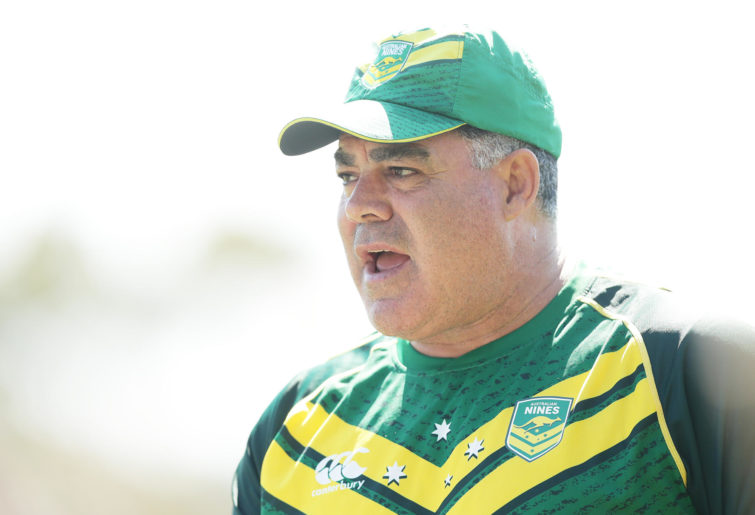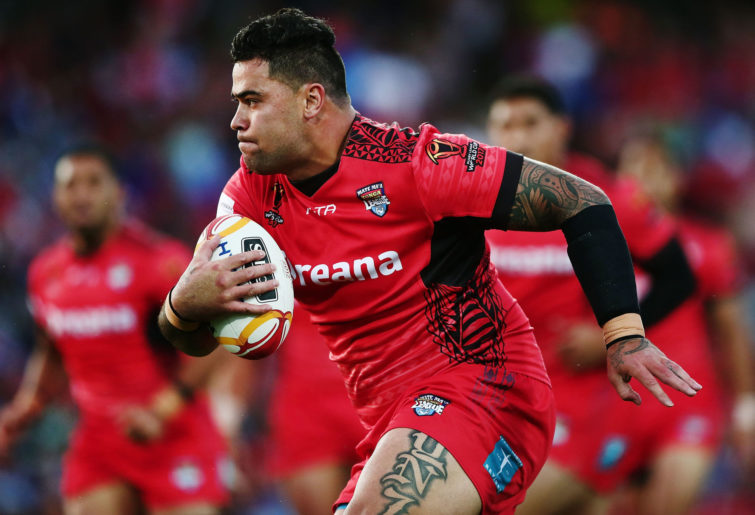As we head into rep round, issues surrounding international eligibility have again been raised, with the likes of Daniel Tupou and Siosifa Talakai featuring in the team lists for both NSW and Tonga.
Mal Meninga weighed in on the issue late last week.
“If they are eligible for NSW or Queensland then they should be picked,” Meninga said in the Daily Telegraph.
“But eligibility needs to be looked at more in-depth. I want no tiers.
“We will have a youth world cup so players will have to make a decision earlier regarding the international space.
“I want to stop the grey area. It should be around where you’re born – but it is very complex and needs some caveats to it.”
It’s not often we should dismiss an Immortal of the game, but Mal’s opinions on this matter are biased to the point of being irrelevant.

Mal Meninga (Photo by Mark Metcalfe/Getty Images)
He’s the coach of the Australian side. He doesn’t just want to win, he needs to if he’s going to keep his job.
So of course he’ll say eligibility “should be around where you’re born” – it not only gives him the choice pick of the best players, it also stops other nations from selecting most of the next-best players.
Sure, the Kiwis and Poms will keep the lion’s share of their squads, but how many players who will represent Pacific Islands nations this weekend were actually born there?
Based on the old saying ‘you’re only as good as your last game’, Mal is the coach of a team that’s worse than Tonga. You know a quick way to ensure that doesn’t happen next time they meet? By not only picking some of the best players from that side to play for you, but also by making the majority of the rest of the Tonga team ineligible to pull on the red jersey based on their birth.
Now, it would be great if we had a team of exclusively Tongan-born players who could beat the Kangaroos.
However, that wouldn’t really mean much for the broader game internationally unless they were matched by teams from Samoa, Fiji, Papua New Guinea, the Cook Islands, Lebanon – the list goes on – who were also born in those nations and able to rumble the Roos every now and then.
But that’s not even close to being reality.
If we’re going to get there, then we need those nations to first become consistently competitive, thereby ensuring the kids who are born there want to play rugby league.
All of which means the current system is the best fit for the current situation.
If you’ll forgive an admittedly flawed analogy, international rugby league right now strikes me as being a little bit like the NRL in 2020.
Melbourne are Australia, in that they have been dominant for decades.
The Roosters are New Zealand, the side next most likely to take out a major prize.
The Eels are England – threatening to do something special, but also maybe going to trip over and make a fool of themselves.
Then comes the rest of the comp. You can pick which club you want to be which country, but the bottom line is that while you’d rather your club was Papua New Guinea or Fiji than Lebanon or the Cook Islands, none are going to be a factor when the whips are cracking (honestly, England aren’t really a factor for winning the big dance either).
The glaring oversight I’ve made here is, of course, Penrith, who burst onto the scene in 2020 and haven’t looked back since.
They’re Tonga.

Andrew Fifita of Tonga in action during the 2017 Rugby League World Cup. (Photo by Anthony Au-Yeung/Getty Images)
And the reason I make this comparison is that, like Penrith in 2020, Tonga may have given the big dogs a beat down, but they haven’t secured the silverware that matters.
More to the point, seeing them announce themselves as players on the big stage does not mean the rest of the problems are solved.
I’ll give some of these other nations sister clubs (again, just hang with my analogy – I know it’s a long way from perfect).
The Tigers are Samoa. The Knights are Fiji. The Dragons are PNG. All have the potential to be great based on the talent they can lay claim to, yet they all have massive, massive issues.
And that’s to say nothing of the likes of Gold Coast-Cook Islands or Canterbury-Lebanon.
To point to Tonga-Penrith and say that a previous minnow now going well – even though they haven’t won any major titles – as evidence everything is fine is to ignore all the other struggling sides.
What’s more, Mal Meninga’s proposal would absolutely belt the one shining light, Tonga, back to the rugby league Stone Age, undoing all the good work that they’ve achieved since the last World Cup.
International rugby league is not healthy and the only way it’s going to get better is to make it consistently competitive.
You reckon we’re going to achieve that by cutting off the pipeline of talent to the weaker teams, based on the preaching of a guy whose employment is dependent on the side he coaches maintaining their dominance?
Getting rid of the tiers should be the aim, but it’s a long, long, long-term aim! And, Mal’s bias aside, his proposal that it be based on where you’re born is never going to work – you can’t expect Tonga, Samoa and Fiji with their respective populations of 100,000, 200,00 and 900,000 (yes, none have even got a million people total) to compete based on their born in-country population.
The long-term solution is the ARLC getting rid of that A at the start and just becoming the Rugby League Commission. Take over the whole game and make the improvement of international footy critical.
Step one as the RLC would be to pay all rep players a comparable wage for the 80 minutes they put in. Origin reps getting just $15,000 a game is a crock considering they’ve taken a 50 per cent pay cut to help HQ make a massive profit during COVID, but NSW and Queensland’s players come across a whole lot less sympathetic when Tonga’s players are getting a reported $2000 to play international footy.
There’s an illustration of the problem right there. Tonga vs the Kiwis will be the first game of elite rugby league in New Zealand for nearly three years, yet the players in the better team – based on the last time the two met – will be paid a pittance compared to what they could earn if they elected to play Origin instead.
What more evidence do you need the current system is tremendously flawed?
That said, while rugby league’s international eligibility laws are not perfect, the fact they let Daniel Tupou play wear blue on Sunday but red at the World Cup show they are fit for the current circumstances.






























































































